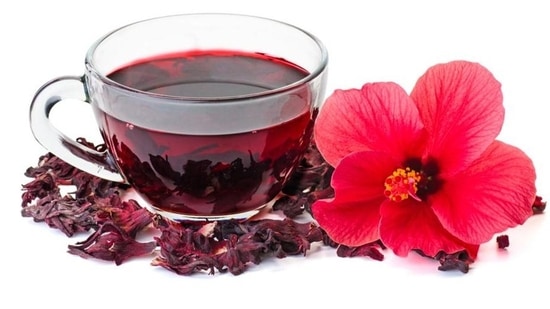
Nayanthara promotes hibiscus tea as a cure-all for diabetes, acne and more but doctor advises caution
8 months ago | 86 Views
In a now-deleted Instagram post, actor Nayanthara claimed that hibiscus tea “is helpful in diabetes, high cholesterol, high blood pressure, and heart related ailments. It is very cooling for the system hence it is great for those who have acne, heat boils on skin etc.” She had added, “Hibiscus tea is great for the monsoon season as it is rich in vitamins and keeps our immune system in equilibrium. It has antibacterial effects that protects from seasonal infection/ illness” and the post has got a few mixed reactions.
Is Hibiscus Tea a Health Miracle?
In an interview with an Lifestyle Magazine, Dr Subrata Das, HOD - Internal Medicine and Diabetology at Sakra World Hospital in Bengaluru, shared, “Hibiscus, characterised by its deep red blossoms and sweet-tart taste similar to cranberries, offers significant health benefits along with some potential risks. This plant is packed with antioxidants, which are molecules that defend against damaging free radicals. Furthermore, hibiscus tea provides small amounts of key minerals, including calcium, magnesium, phosphorus and potassium.”
He revealed, “Hibiscus has garnered significant interest in medical research due to its high polyphenol content. Polyphenols, a broad class of chemicals with antioxidant effects, are found in many foods and are especially plentiful in hibiscus. Research indicates that hibiscus tea may aid in lowering blood pressure; however, it is not advisable for those on blood pressure medication due to possible interactions. Studies have also suggested that hibiscus tea might lower bad cholesterol and triglyceride levels in people with diabetes and metabolic syndrome. However, these results are not entirely consistent and further large-scale trials are necessary to confirm these potential benefits.”
Hibiscus Tea: Benefits and Risks Unveiled
Dr Subrata Das highlighted, “Antioxidants including beta-carotene, vitamin C, and anthocyanins abound in hibiscus. Antioxidants are essential for eliminating free radicals, which are dangerous chemicals that can injure cells and aggravate conditions like diabetes, heart disease and cancer. Hibiscus and other foods high in antioxidants can assist your body fight oxidative stress and possibly reduce your chance of developing certain illnesses. Therefore, by helping to lower blood sugar levels and improve insulin sensitivity, hibiscus tea may help control diabetes. Hibiscus extract may reduce fasting blood glucose levels and enhance glycaemic management in general, according to research. The presence of chemicals in hibiscus that affect insulin action and carbohydrate metabolism is probably the cause of this advantage.”
Talking about high blood pressure, he said, “Severe health problems like heart attack, stroke, heart failure, and renal disease can be brought on by high blood pressure. Hibiscus tea has been demonstrated in clinical trials to reduce blood pressure, particularly in people with mild to moderate hypertension. Owing to its capacity to relax blood vessels and enhance blood flow, hibiscus tea has been linked to a slight drop in both systolic and diastolic blood pressure when consumed regularly. Hibiscus tea may help lower blood pressure a little but it cannot take the place of prescription hypertension drugs.”
Claiming that hibiscus can help with acne since it boosts liver function, Dr Subrata Das explained, “Its antioxidants, which include vitamin C and anthocyanins, lessen inflammation and oxidative stress, which are associated to acne, and shield the liver from pollutants. Vitamin C lessens the severity of acne by promoting the synthesis of collagen and repairing skin. Rich in antioxidants, vitamin C and vital minerals, hibiscus tea can boost your immunity and help you recover from the flu. In addition to its vital role in immune system defense against viruses, vitamin C also stimulates the development of white blood cells, which are essential in fighting infections. Hibiscus flowers also contain proanthocyanidins and flavonoids, which may help reduce fever.”
He elaborated, “Hibiscus tea may provide antibacterial properties. It contains antibacterial compounds such as saponins, flavonoids, and tannins. Hibiscus extract inhibits E. coli and may also be effective at fighting other bacterial strains. Flavonoids inhibit bacteria by forming complex compounds against extracellular proteins of bacterial cells, which disrupt the integrity of the bacterial cell membrane.”
Concluding, Dr Subrata Das cautioned, “Drinking hibiscus tea comes with potential risks, particularly for pregnant women, individuals on certain medications, or those with specific health conditions. It can cause stomach upset or gas and some people might have allergic reactions to it. While hibiscus tea provides numerous health benefits due to its high antioxidant and polyphenol content, it is crucial to be aware of its potential interactions and side effects. Since everyone's body is different, a diet that works for one person may not be suitable for another. It's essential to understand your body's needs and consult with your doctor. People can enjoy one cup of hibiscus tea per day. Additional research is needed to fully comprehend its effects on health.”
Read Also: India's Olympic medalist Manu Bhaker follows this fitness routine to stay on top of her game #




















